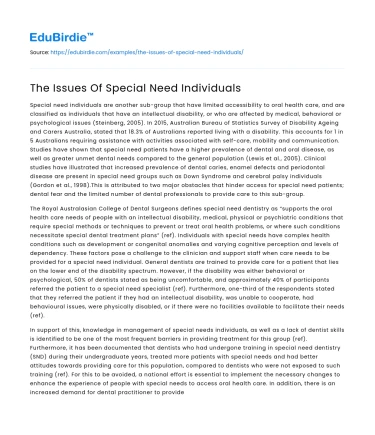Special need individuals are another sub-group that have limited accessibility to oral health care, and are classified as individuals that have an intellectual disability, or who are affected by medical, behavioral or psychological issues (Steinberg, 2005). In 2015, Australian Bureau of Statistics Survey of Disability Ageing and Carers Australia, stated that 18.3% of Australians reported living with a disability. This accounts for 1 in 5 Australians requiring assistance with activities associated with self-care, mobility and communication. Studies have shown that special need patients have a higher prevalence of dental and oral disease, as well as greater unmet dental needs compared to the general population (Lewis et al., 2005). Clinical studies have illustrated that increased prevalence of dental caries, enamel defects and periodontal disease are present in special need groups such as Down Syndrome and cerebral palsy individuals (Gordon et al., 1998).This is attributed to two major obstacles that hinder access for special need patients; dental fear and the limited number of dental professionals to provide care to this sub-group.
The Royal Australasian College of Dental Surgeons defines special need dentistry as “supports the oral health care needs of people with an intellectual disability, medical, physical or psychiatric conditions that require special methods or techniques to prevent or treat oral health problems, or where such conditions necessitate special dental treatment plans” (ref). Individuals with special needs have complex health conditions such as development or congenital anomalies and varying cognitive perception and levels of dependency. These factors pose a challenge to the clinician and support staff when care needs to be provided for a special need individual. General dentists are trained to provide care for a patient that lies on the lower end of the disability spectrum. However, if the disability was either behavioral or psychological, 50% of dentists stated as being uncomfortable, and approximately 40% of participants referred the patient to a special need specialist (ref). Furthermore, one-third of the respondents stated that they referred the patient if they had an intellectual disability, was unable to cooperate, had behavioural issues, were physically disabled, or if there were no facilities available to facilitate their needs (ref).
Save your time!
We can take care of your essay
- Proper editing and formatting
- Free revision, title page, and bibliography
- Flexible prices and money-back guarantee
In support of this, knowledge in management of special needs individuals, as well as a lack of dentist skills is identified to be one of the most frequent barriers in providing treatment for this group (ref). Furthermore, it has been documented that dentists who had undergone training in special need dentistry (SND) during their undergraduate years, treated more patients with special needs and had better attitudes towards providing care for this population, compared to dentists who were not exposed to such training (ref). For this to be avoided, a national effort is essential to implement the necessary changes to enhance the experience of people with special needs to access oral health care. In addition, there is an increased demand for dental practitioner to provide services for individuals with special needs regardless of their separate specialisations since it will take time before sufficient SND specialist are available to cater for the individuals with advanced health care needs.
Another issue that prevents access to oral health care for special need individuals is fear and anxiety. A study stated that 17.2% of its special need participants identified dental fear to be a reason to not utilise general health care (Gordon et al., 1998). The use of pharmacologic modalities such as oral and parenteral sedation, as well as general anesthesia, is perceived as being inadequate by special-needs patients and has a direct negative impact on the frequency of dental visits, since a substantial portion of special-needs patients report that they would utilise oral health care services more frequently if anesthesia and sedation services were offered.






 Stuck on your essay?
Stuck on your essay?

